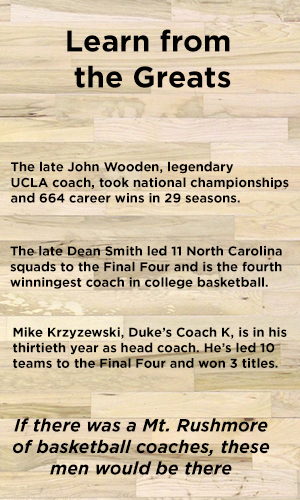March Madness isn’t Mad: Keys to Building High-Trust Teams
I have a confession to make. While I’m not the world’s biggest basketball fan, I’m as caught up in the swirl of March Madness as if I had center court seats.
This whole competition—with its single elimination format, the interplay of luck and skill, and of course the upsets, feels very entrepreneurial to me. But what really connects for me is that basketball, like entrepreneurship, is such a team sport.
From working in a startup environment my entire career and going through a number of successful exits, I appreciate just how much trust it takes build a championship team.
Building Trust in High-trust Teams
 Trust is the cornerstone of every successful entrepreneurial company. Building trust is all about relationships. Here are a few winning strategies:
Trust is the cornerstone of every successful entrepreneurial company. Building trust is all about relationships. Here are a few winning strategies:
“In leadership, there are no words more important than trust. In any organization, trust must be developed among every member of the team if success is going to be achieved.”
Mike Krzyzewski
- Words don’t build trust; actions do. Team trust starts with trust in the CEO. State the goals and set the direction. Then do what you say you are going to do. If at some point—and it better not be often—you have to walk back your words, own it. Bring people together and tell them straight up what has changed and why.
“Be prepared and be honest.”
John Wooden
- Input, yes. Consensus management, no. Give everyone the opportunity to provide input to decisions. Ensure that all input is heard and considered. Then let the person who owns the decision decide.
“Basketball is a team game. But that doesn’t mean all 5 players should take the same amount of shots”
Dean Smith
- Once a decision is made, everyone lines up behind the goal. If they can’t, put them on “waivers” and let them go to another team.
“Failure is not fatal, but failure to change might be.”
John Wooden
- Commit in word and deed to a culture of respect, inclusion, and diversity. Don’t tolerate any behavior that is otherwise. Period.
“I would never recruit a player who yells at his teammates, disrespected his high school coach, or scores 33 points a game and his team goes 10-10″
Dean Smith
And a few winning tactics
- High trust teams are really open. Address rumbling and grumbling immediately. Don’t assume that just because your employees are adults that they’ll figure it out for themselves. They probably won’t. Change the focus. Get everyone in a room—it might be a weekly status meeting or a quarterly offsite. Talk about shared goals. Each team member needs to understand how he or she contributes to the goal.
“Communication does not always occur naturally, even among a tight-knit group of individuals. Communication must be taught and practiced in order to bring everyone together as one.”
Mike Krzyzewski
- Hire team members who fit into the team. In the beginning of a startup, people tend to be willing to do what it takes to get things done. Don’t let your need for sales leadership, financial expertise, engineering skills or any other expertise cause you to choose a person who operates on his or her own agenda and whose goals don’t line up with the rest of the team. Engage other team members in the interview process.
“The key ingredient to stardom is the team.”
John Wooden
- As soon as you know you made a hiring mistake, fix it.
“When a leader takes responsibility for his own actions and mistakes, he not only sets a good example, he shows a healthy respect for people on his team.”
Mike Krzyzewski
- Give all employees at least one major shared goal. It can be margin, revenue, customer acquisition, client retention, or customer service. Team members may have separate, functional goals, but everyone must have something in common to shoot for.
“Basketball is a beautiful game when the five players on the court play with one heartbeat”
Dean Smith
And lastly, get out of your own way. In high trust organizations, leaders delegate.
Looking back on the companies I’ve worked for, the biggest challenge to trust I’ve seen has been in the founders themselves.
They build these great teams, and then it’s hard to let go and trust in the people they have hired to take on bigger roles. Entrepreneurs may fear that employees aren’t going to take on responsibilities with the same fervor or passion. They stay too involved. There’s no worse way to sacrifice trust.
Although it’s really difficult, entrepreneurs who successfully lead their companies into the growth phase and on toward the curve in the hockey stick, learn how to take a step back and become more of a coach and less of a player over time.
A true test of trust happens when a company starts to scale.
Enjoy this weekend’s Final Four!

